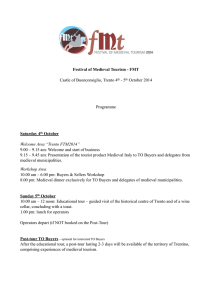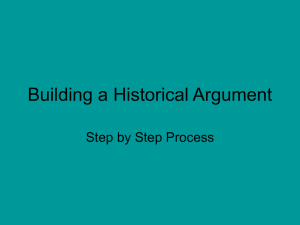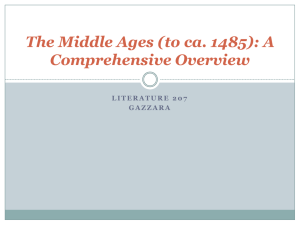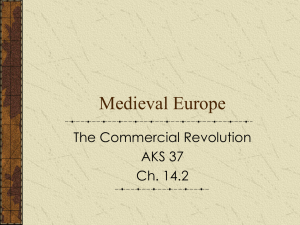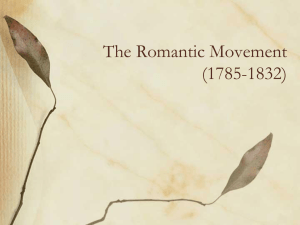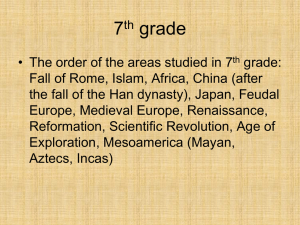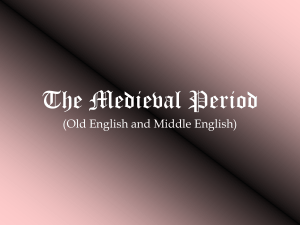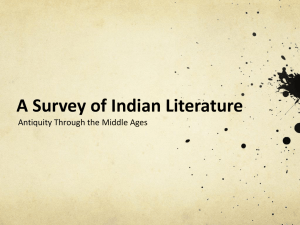Hagia Sophia
advertisement
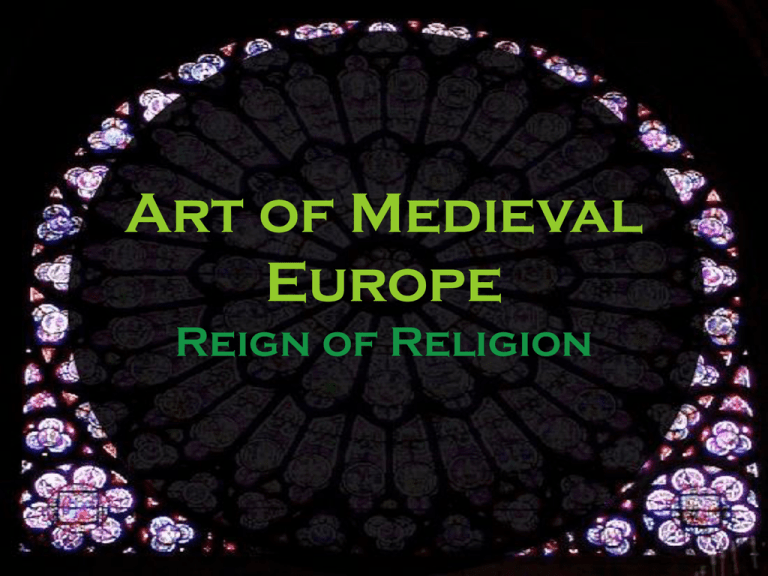
Art of Medieval Europe Reign of Religion Art of Medieval Europe 400 A.D. to 1400 A.D. A mixture of Roman, Middle Eastern & European influences Art is primarily made for the church Begins with Fall of the Roman Empire; Ends with the Renaissance Art of Medieval Europe 400 A.D. to 1400 A.D. Two divisions linked to different global locations: Art of Medieval Europe 400 A.D. to 1400 A.D. These two divisions are linked to global locations: Europe: Romanesque & Gothic Art of Medieval Europe 400 A.D. to 1400 A.D. These two divisions are linked to global locations: Europe: Romanesque & Gothic The East: Early Islamic & Byzantine Art of Medieval Europe 400 A.D. to 1400 A.D. invaders from Northern Europe, primarily Germany, destroy almost everything Rome developed Art of Medieval Europe 400 A.D. to 1400 A.D. invaders from Northern Europe, primarily Germany, destroy almost everything Rome developed Buildings Art of Medieval Europe 400 A.D. to 1400 A.D. invaders from Northern Europe, primarily Germany destroy almost everything Rome developed Buildings Sculpture Art of Medieval Europe 400 A.D. to 1400 A.D. invaders from Northern Europe, primarily Germany destroy almost everything Rome developed Buildings Sculpture government Art of Medieval Europe 400 A.D. to 1400 A.D. Social Changes of the Medieval Period: Art of Medieval Europe 400 A.D. to 1400 A.D. Social Changes of the Medieval Period: The center of art and innovation moves away from Rome to the North of Europe – Art of Medieval Europe 400 A.D. to 1400 A.D. Social Changes of the Medieval Period: The center of art and innovation moves away from Rome to the North of Europe – Britain, France, Germany Art of Medieval Europe 400 A.D. to 1400 A.D. Social Changes of the Medieval Period: The center of art and innovation moves away from Rome to the North of Europe – Britain, France, Germany There is no central base of power coming from Rome – Art of Medieval Europe 400 A.D. to 1400 A.D. Social Changes of the Medieval Period: The center of art and innovation moves away from Rome to the North of Europe – Britain, France, Germany There is no central base of power coming from Rome – many different rulers all fighting for power Art of Medieval Europe 400 A.D. to 1400 A.D. Religious Changes of Medieval Period: Art of Medieval Europe 400 A.D. to 1400 A.D. Religious Changes of Medieval Period Focus of life changes from here and now to life hereafter (what happens after Death?) Art of Medieval Europe 400 A.D. to 1400 A.D. Religious Changes of Medieval Period Focus on gaining acceptance into a Christian Heaven Art of Medieval Europe 400 A.D. to 1400 A.D. Religious Changes of Medieval Period Focus on gaining acceptance into a Christian Heaven Human body no longer celebrated as a beautiful thing It’s now sinful and corrupt Art of Medieval Europe 400 A.D. to 1400 A.D. Art Changes of Medieval Period: Art of Medieval Europe 400 A.D. to 1400 A.D. Art Changes of Medieval Period: Art no longer concerned with harmony, balance and realism… Art of Medieval Europe 400 A.D. to 1400 A.D. Art Changes of Medieval Period: Art no longer concerned with harmony, balance and realism… art now concerned with worshipping God & converting people to Christianity Art of Medieval Europe 400 A.D. to 1400 A.D. Art Changes of Medieval Period: Art of Medieval Europe 400 A.D. to 1400 A.D. Art Changes of Medieval Period: Greco-Roman interest in realism dies. Art of Medieval Europe 400 A.D. to 1400 A.D. Art Changes of Medieval Period: Greco-Roman interest in realism dies. Art becomes the servant of the Church Gothic Art 1200 to 1400 A.D. Gothic Art 1200 to 1400 A.D. Northern European Germany, England, Parts of France Gothic Art 1200 to 1400 A.D. Northern European Germany, England, Parts of France Art is primarily highly decorated cathedrals, stained glass windows & skinny sculptures Gothic Art 1200 to 1400 A.D. Northern European Germany, England, Parts of France Art is primarily highly decorated cathedrals, stained glass windows & skinny sculptures Believed a beautiful church with beautiful art would inspire people To believe in God & be good Gothic Art 1200 to 1400 A.D. Notre Dame Cathedral France, 1200 AD ARCHITECTURE: Huge cathedrals that took centuries to make Gothic Art 1200 to 1400 A.D. Very tall with lots of windows to let in light Gothic Art 1200 to 1400 A.D. Pointed arches and vaults Decorated with lacey, intricate Decorations of cut Stone Gothic Art 1200 to 1400 A.D. SCULPTURE: Greco-Roman interest in realism dies. Long and skinny figures that are very unnatural Gothic Art 1200 to 1400 A.D. Show ignorance of human anatomy As the focus is now on religion & the spirit, not body. Gothic Art 1200 to 1400 A.D. Show ignorance of human anatomy As the focus is now on religion & the spirit, not body. Figures are covered with heavy drapery to hide the body no more nudes Gothic Art 1200 to 1400 A.D. Stained glass Lets in light Illustrates stories of the bible Used to help illiterate church goers to understand stories of the Bible STAINED GLASS Symbols, patterns and Designs STAINED GLASS Symbols, patterns and Designs STAINED GLASS Figures from historical events STAINED GLASS Creatures of lore STAINED GLASS Creatures of lore Medieval Illuminated Manuscripts & Bestiaries Highly decorative borders, initials & spot illustrations Seemed to ‘glow’ Vibrant color & real gold used for embellishment Most illuminated manuscripts were religiously based Bible stories Medieval Bestiaries Some illuminated manuscripts depicted animals & birds in an encyclopedia-like format known as bestiaries description of: animal’s appearance habitat Behaviors symbolic attributes Illustration Byzantine Art 400 to 1400 A.D. Eastern Mediterranean Art: Byzantine Art 400 to 1400 A.D. Eastern Mediterranean Art: Turkey, Jerusalem, portions of Europe and Middle East Byzantine Art 400 to 1400 A.D. Eastern Mediterranean Art: Turkey, Jerusalem, portions of Europe and Middle East Combination of Early Christian Art Middle Eastern influences Known for a plethora of decoration & color Byzantine Art 400 to 1400 A.D. ARCHITECTURE: Byzantine Art 400 to 1400 A.D. ARCHITECTURE: Created cathedrals that all other cathedrals thereafter would copy Byzantine Art 400 to 1400 A.D. ARCHITECTURE: Byzantine Art 400 to 1400 A.D. ARCHITECTURE: Full of mosaics pieces of cut glass affixed to a flat surface Byzantine Art 400 to 1400 A.D. ARCHITECTURE: Full of mosaics pieces of cut glass affixed to a flat surface Many windows & huge interiors Creates airy and bright Interiors Byzantine Art 400 to 1400 A.D. ARCHITECTURE: What effect would these bright, large, beautiful cathedrals have on those who worship in it? Byzantine Art 400 to 1400 A.D. ARCHITECTURE: So…… why would Byzantine leaders want to build cathedrals in this way? Hagia Sophia - Turkey 530 A.D. Hagia Sophia - Turkey 530 A.D. Hagia Sophia - Turkey Which elements are of a Roman influence? Hagia Sophia - Turkey 530 A.D. Hagia Sophia - Turkey 530 A.D. EARLY ISLAMIC ART EARLY ISLAMIC ART Islam - Religion based around the prophet Mohammed & the god Allah, EARLY ISLAMIC ART Islam - Religion based around the prophet Mohammed & the god Allah, developed around 600 A.D. EARLY ISLAMIC ART Islam - Religion based around the prophet Mohammed & the god Allah, developed around 600 A.D. Islam forbids idolatry (the representation of human forms) particularly that of Allah and/or his prophets EARLY ISLAMIC ART Artwork is instead geometric & Abstract shows no living creatures EARLY ISLAMIC ART Artwork is instead geometric & Abstract shows no living creatures Sculpture was thought evil most artwork was giant religious architecture & architectural decoration EARLY ISLAMIC ART Most well-known Islamic art is the mosque, or religious place of worship Dome of the Rock, Jerusalem, 7th century Built around the rock upon which Muslims believe Mohammed rose to Heaven. EARLY ISLAMIC ART Most well-known Islamic art is the mosque, or religious place of worship Dome of the Rock, Jerusalem, 7th century Oldest piece of Islamic architecture Exterior: Giant dome covered with melted down gold coins Early Islamic Art Main building covered with colorful Turkish tiles in abstract designs

